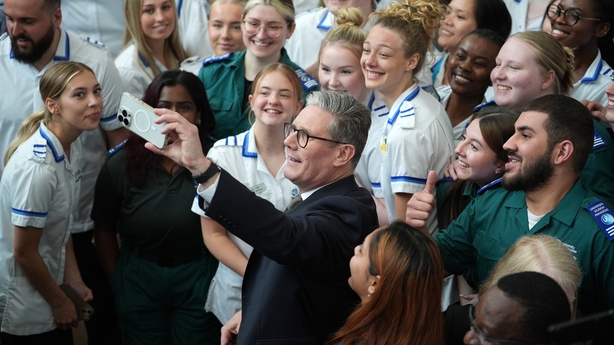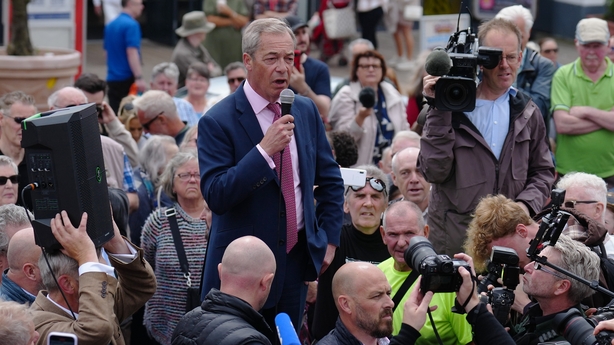Rishi Sunak must be hoping the end of this general election campaign is nigh.
With less than two weeks to go to the vote in the UK, polling this week suggests that for Mr Sunak and his Conservative Party the election is in many ways already over.
Every time the British Prime Minister denies that he is now simply going through the motions of a campaign, another headline underline the futility of his position.
Where there are glimmers of hope for the Tories, they are scarce and short-lived.
This week provided one such glint for the beleaguered leader of the Conservative Party in the form of positive news on inflation figures.
Results out on Wednesday morning showed UK inflation had returned to its 2% target in May for the first time in almost three years.
Chancellor of the Exchequer Jeremy Hunt was quick to say the inflation figures were proof that the "difficult decisions" the Conservative Party had taken in relation to the economy had "paid off", adding that it would not have happened had Labour been in power.
But in what has become a wearily predictable routine for Mr Sunak and the Tory Party in this campaign, the good news did not last long.
Revelations that 882 people had crossed the English Channel on Tuesday – the highest number in a single day so far this year - left Mr Sunak once again on the defensive in relation to his party's immigration policy.
With "Stop the Boats" a key promise of the current prime minister, the inability to do so was seized upon by both opposition parties and voters alike.
And there was worse to come.
Several new polls predicting a cataclysmic wipe-out of seats for his party rained further on his parade.

Polling from YouGov predicted a record defeat for Mr Sunak's party, suggesting the Tories would end up with 108 seats after 4 July.
A loss on the scale suggested by that YouGov poll – which puts Labour on course to win 425 seats – would be seismic for the Conservatives and give Labour its best result ever.
Not to be outdone though, a poll from Savanta a short time later suggested that the Conservatives could return as few as 53 MPs.
The same poll suggested the Liberal Democrats would return 50 seats putting the two parties almost on a par.
Chris Hopkins, Political Research Director at Savanta, said its projection put Labour on course "for a historic majority" but of course any historic win would come on foot of a historic loss for the Conservatives.
It also suggested that Mr Sunak could lose his own seat in Yorkshire, one previously considered "safe"
If the current polling trends were to play out on 4 July it would make a nonsense of the idea of "safe" Tory seats, with a suggestion in some quarters that almost half of the current British cabinet would not be returned to the House of Commons.
While all politicians will tell you that there is only one poll that matters and that is due to happen on 4 July, the clear lesson from these surveys is that the gap appears to be widening further for the Tories as the campaign continues.

The party's plight has not been helped by the entry of Nigel Farage into one constituency in Clacton-on-Sea.
A lightning rod for those on the right wing of the Conservative Party, his Reform Party looks to be further splitting a diminishing Tory vote.
It has so far been a campaign littered with missteps for the Conservatives.
From its beginning in a rain-soaked Downing Street to the ruinous decision to leave D-Day commemorations early, Mr Sunak has lost ground when he most needed to gain it.
The latest crisis to engulf the party involves betting on the election date.
Several investigations into bets placed on the timing of the election are now under way, concentrated around people who worked closely with Mr Sunak or knew those who did.
In a double blow one of those being investigated was until this week the election campaign chief for the Conservatives.
Tony Lee stood down from his position after the reports that he and his wife, Laura Saunders, a candidate for the Tories in Bristol, were under investigation by the UK's Gambling Commission.
There is no suggestion that Mr Sunak was in any way involved, but it all adds to an image of a chaotic and badly run campaign and is another example of a headline that Rishi Sunak could do without.
It’s little surprise then that Mr Sunak described himself as "incredibly angry" about the allegations.
He is not alone. Many within his party are aghast at how with just a fortnight to go it is this story dominating the headlines and not any of the attack lines on the Labour Party.
Furthermore, the suggestion among some British media that a spike in betting on the election date can be traced back to the day before the election was called means that many in the Tory Party are deeply concerned about more revelations coming out in the days ahead.
Michael Gove, the Secretary for Levelling Up described the events around the betting investigations as "deeply regrettable" and acknowledged that to the public such headlines look "not great".
It is an idiom which could be applied to the Conservatives entire election campaign so far.




